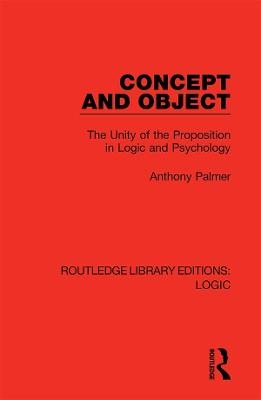
Concept and Object
The Unity of the Proposition in Logic and Psychology
Seiten
2021
Routledge (Verlag)
978-0-367-42625-5 (ISBN)
Routledge (Verlag)
978-0-367-42625-5 (ISBN)
Originally published in 1988. This text gives a lucid account of the most distinctive and influential responses by twentieth century philosophers to the problem of the unity of the proposition. The final chapters illustrate the way in which a response to the problem affects the way we think about the nature of the mind.
Originally published in 1988. This text gives a lucid account of the most distinctive and influential responses by twentieth century philosophers to the problem of the unity of the proposition. The problem first became central to twentieth-century philosophy as a result of the depsychoiogising of logic brought about by Bradley and Frege who, responding to the ’Psychologism’ of Mill and Hume, drew a sharp distinction between the province of psychology and the province of logic.
This author argues that while Russell, Ryle and Davidson, each in different ways, attempted a theoretical solution, Frege and Wittgenstein (both in the Tractatus and the Investigations) rightly maintained that no theoretical solution is possible. It is this which explains the importance Wittgenstein attached in his later work to the idea of agreement in judgments. The two final chapters illustrate the way in which a response to the problem affects the way in which we think about the nature of the mind. They contain a discussion of Strawson’s concept of a person and provide a striking critique of the philosophical claims made by devotees of artificial intelligence, in particular those made by Daniel Dennett.
Originally published in 1988. This text gives a lucid account of the most distinctive and influential responses by twentieth century philosophers to the problem of the unity of the proposition. The problem first became central to twentieth-century philosophy as a result of the depsychoiogising of logic brought about by Bradley and Frege who, responding to the ’Psychologism’ of Mill and Hume, drew a sharp distinction between the province of psychology and the province of logic.
This author argues that while Russell, Ryle and Davidson, each in different ways, attempted a theoretical solution, Frege and Wittgenstein (both in the Tractatus and the Investigations) rightly maintained that no theoretical solution is possible. It is this which explains the importance Wittgenstein attached in his later work to the idea of agreement in judgments. The two final chapters illustrate the way in which a response to the problem affects the way in which we think about the nature of the mind. They contain a discussion of Strawson’s concept of a person and provide a striking critique of the philosophical claims made by devotees of artificial intelligence, in particular those made by Daniel Dennett.
Palmer/, Anthony
Preface 1. The Depsycholigising of Logic 2. Denoting and the Variable 3. Concept and Object 4. Colourless Objects 5. Categories of Linguistic Expression 6. Truth and Meaning 7. Agreement In Judgments 8. Private Objects and Public Language 9. The New Way of Ideas
| Erscheinungsdatum | 06.04.2021 |
|---|---|
| Reihe/Serie | Routledge Library Editions: Logic |
| Verlagsort | London |
| Sprache | englisch |
| Maße | 129 x 198 mm |
| Gewicht | 453 g |
| Themenwelt | Geisteswissenschaften ► Philosophie ► Logik |
| Geisteswissenschaften ► Psychologie ► Allgemeine Psychologie | |
| Mathematik / Informatik ► Mathematik | |
| ISBN-10 | 0-367-42625-0 / 0367426250 |
| ISBN-13 | 978-0-367-42625-5 / 9780367426255 |
| Zustand | Neuware |
| Haben Sie eine Frage zum Produkt? |
Mehr entdecken
aus dem Bereich
aus dem Bereich
ein Gegenentwurf zum kurzfristigen Denken : so werden wir zu den …
Buch | Hardcover (2023)
REDLINE (Verlag)
CHF 27,90


